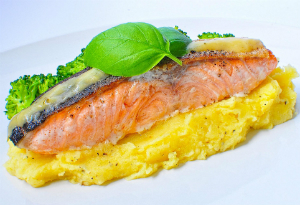World Health Day: 10 Foods to help with your Studies
- Last updated 07 Apr 2015
Because sometimes a Starbucks simply won’t cut it.

We’ve all been there: the 3pm slump. Drooping over the keyboard while reaching for the coffee, with a seemingly never-ending pile of work to get through.
But it’s World Health Day, and what better excuse than to give you the low-down on fail-safe solutions that are as good for your body as they are for your focus.
Porridge
They say breakfast is the most important meal of the day, and with good reason. Not only does it give you the first boost of energy to start your day, but studies have also shown breakfast eaters are at lower risk for obesity, hypertension and diabetes, in comparison to those who prefer to skip it. Experts recommend eating porridge, which is low in calories but will help you feel fuller longer. To jazz it up, load up on fresh fruit for a touch of sweetness or cinnamon for some spice.
Dark Chocolate
Feel-good dark cocoa brings more benefits than coffee. Dark chocolate boosts serotonin and endorphin levels, which are associated with greater concentration. It’s also a source of antioxidants, vitamins, and minerals, which can work with a healthy diet to control blood pressure. It’s also lower in fat and sugar than milk or white chocolate, which makes it a really healthy option, but be mindful of the calorie count and always aim for the highest quality: experts say one square of dark chocolate during the afternoon slump should be sufficient to boost energy levels.
Water
Thirst and dehydration can cause fatigue, but if you reach for a cup of coffee or an energy drink, it will actually dehydrate you further, causing you to feel worse later. So before you do anything, drink a tall 10-ounce glass of water. Squeeze some fresh lemon in it for a little extra kick.
Blueberries
Not only are blueberries wonderfully tasty and rich in antioxidants, but they’ve also been said to be a memory booster. A 2010 report published by the Journal of Agricultural and Food Chemistry revealed those who drank blueberry juice every day for two months significantly improved their performance on learning and memory tests. Whenever those snack cravings kick in, consider enjoying some fresh, ripe blueberries over sugary sweets any day.
Salmon
Salmon is a concentrated source of omega-3 fatty acids, which help rebuild brain cells, slow cognitive decline, and also strengthen the synapses in your brain related to memory. The protein in salmon contains amino acids, which are essential for keeping your brain focused and sharp.
Try pairing salmon with eggs for breakfast, for a head start to your working day.
Green Tea
If you’re feeling drained by mid-day, think twice before grabbing that extra cup of coffee, especially if you take sugar as it can easily rack up your calorie intake during the day as well as unwanted jitters. Also, too much consumption of caffeine can cause headaches, which will only hurt your concentration. Green tea does contain a more modest amount of caffeine, but it is balanced by the amino acid theanine: studies show theanine improves mental alertness and focus. If you need that afternoon pick-me-up, green tea is your ticket.”
Beetroot
This humble root veggie is a superstar for promoting better memory, focused concentration and overall cognition. Beetroot contains nitrates that dilate the blood vessels, increase blood flow and oxygen to the brain, thereby improving mental performance. Add them to salads, roast them or add to juices for optimal brain health.
Bananas
If you’re in a hurry, make sure to grab a banana to ward off hunger pangs while on the go. Not only are they sweet and delish, but they can also help boost your concentration. A 2008 study found that students who ate bananas before exams actually did better than those who didn’t. Bananas are rich in potassium, an essential mineral crucial for keeping your brain, nerves, and heart in tip-top shape.
Spinach
Popeye sure knew his stuff. But far from being good for sprouting muscles, spinach is loaded with lutein, folate, and beta-carotene, which are linked with preventing dementia. Some neurologists recommend eating spinach at least three times a week.
Eggs
Faddy diets might tell you to ditch the yolk when preparing eggs, but some nutrition experts actually insist on keeping it. Whole eggs, yolk included, are a dense source of the omega-3 fatty acid DHA which has a positive effect upon memory and mood. Eggs also contain choline, a compound that can help maintain healthy brain cell membranes. To save time, boil up a batch of eggs for the week ahead to have them on hand as quick easy snacks.
News
- Careers advice under the microscope: apprenticeships ‘are largely ignored’
- The countries defying the traditional ‘9 –5’
- The most popular apprenticeships revealed
- Apprenticeship Vacancies Up Almost A Third
- UK School Leavers lack skills compared to rest of Europe
- Over half of ‘Generation Z’ feel unprepared for the future, says Adobe study
- Parents think extra-curricular activities are as important as education
- Businesses need more Apprentices and these Events will show them why
- The majority of UK teachers say their school’s careers service is “inadequate”
- New app will encourage students to vote